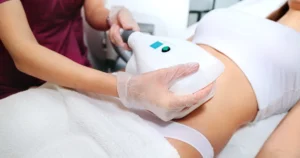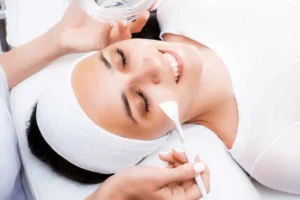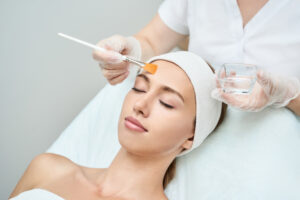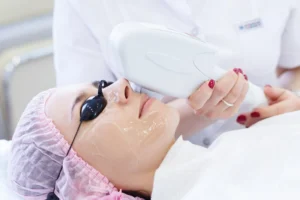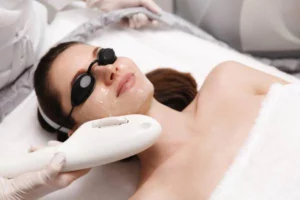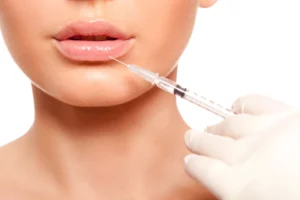Table of Contents
If you’re looking for a way to rejuvenate and refresh your skin, chemical peels might be the solution. With the right approach, this treatment can help improve various skin concerns, from fine lines and wrinkles to acne scars and hyperpigmentation. At Sculpt Aesthetics in Meridian, we provide safe and effective chemical face peels tailored to your unique skin needs. In this guide, we’ll walk you through everything you need about chemical peel treatment—from what to expect to how to prepare and care for your skin afterward.
What is a Chemical Peel?
A chemical peel aims to remove the epidermis’ outermost layers, exposing healthier, more youthful skin beneath. Throughout the process, the skin is treated with a chemical solution, which exfoliates it and eventually causes it to peel off. This process results in a smoother, more even, and more exact skin tone, encouraging new skin cell production.
There are three main types of chemical peels:
- Superficial Peels: Light peels are the mildest form and target only the outer layer of skin (the epidermis). They’re ideal for mild skin concerns like slight discoloration and dryness.
- Medium Peels penetrate a bit deeper and can address issues like age spots, fine lines, and moderate discoloration.
- Deep Peels: The most intensive option, deep peels penetrate the lower dermal layer and can be effective for deeper wrinkles, scars, and more severe skin issues.
At Sculpt Aesthetics, we offer a variety of chemical peels explicitly tailored to the unique skin concerns of our Meridian clients.
How to Prepare for a Chemical Peel
Preparation is critical to getting the most out of your chemical face peel. Here are some essential steps to follow:
- Consult with a Professional: A consultation is crucial before beginning treatment. During this appointment, our experts will evaluate your skin type, discuss your objectives, and choose the best peel.
- Avoid Sun Exposure: Limit sun exposure as much as possible in the days before your appointment. UV exposure can increase skin sensitivity, leading to adverse reactions during the peel.
- Discontinue Certain Products: You may be advised to stop using certain skincare products, especially those containing retinoids, glycolic acid, or other exfoliating agents. These products can increase your skin’s sensitivity.
- Stay Hydrated and Moisturized: Keeping your skin hydrated and moisturized will help minimize irritation and promote a quicker healing process post-treatment.
Following these preparation tips will help ensure that your chemical peel treatment goes smoothly and delivers optimal results.
What to Expect During Your Chemical Peel Appointment
Any worries about receiving a chemical peel treatment might be alleviated by being aware of the procedure. What usually occurs during a chemical peel session is as follows:
- Cleansing the Skin: The first step involves thoroughly cleansing your face to remove impurities. This ensures that the chemical solution is applied evenly.
- Application of the Chemical Solution: A specific chemical solution is applied once your skin is prepared. You may feel a slight tingling or stinging sensation, which is normal and indicates that the solution is working.
- Neutralizing and Removing the Solution: After a few minutes, the chemical solution is neutralized and gently removed. No neutralization is required for some peels, and the solution is left to self-neutralize over a few hours.
- Soothing and Moisturizing: Your skin may feel slightly warm or tight after the peel. A gentle cream or moisturizer will help alleviate any initial discomfort.
Most chemical peel treatments take 30 minutes to an hour, making them convenient for those looking for a quick but effective skincare treatment.
Post-Care: Essential Tips for Healing and Recovery
After your chemical face peel, your skin will be more sensitive, so it’s crucial to follow these aftercare steps:
- Avoid Direct Sun Exposure: UV rays can cause damage to the newly exposed skin, leading to hyperpigmentation or other complications. When going outside, apply a broad-spectrum SPF 30 or higher, and consider wearing a wide-brimmed hat for extra protection.
- Skip the Makeup for a Few Days: To avoid irritation, give your skin time to breathe and refrain from wearing makeup for at least 48 hours following treatment.
- Keep the Skin Moisturized: Apply a gentle, hydrating moisturizer to nourish your skin. This helps prevent dryness and promotes a smoother peeling process.
- Avoid Scrubbing or Picking: As your skin peels, resist the urge to pick or scrub it. Let the peeling happen naturally to prevent scarring or irritation.
- Stay Hydrated and Eat a Healthy Diet: Drinking water and eating antioxidant-rich foods can further support your skin’s healing process.
By following these steps, you’ll minimize discomfort and maximize the effectiveness of your chemical peel treatment.
The Benefits of Chemical Peels for Different Skin Concerns
Chemical peels are a versatile solution that can address various skin concerns, making them suitable for many people. Here are some common issues that chemical peels can help with:
- Fine Lines and Wrinkles: Frequent chemical peel procedures can reduce wrinkles and fine lines by increasing collagen synthesis and skin cell turnover.
- Acne and Acne Scars: Certain chemical peels can help manage acne breakouts by unclogging pores and reducing oil production.
- Sun Damage and Age Spots: Chemical peels can help diminish sunspots, age spots, and hyperpigmentation caused by sun exposure, leaving you with a more even skin tone.
- Melasma: Dark spots on the skin may result from this disorder, which is frequently brought on by hormonal fluctuations. Melasma can be less noticeable with chemical peels, while the most outstanding results could require several treatments.
Because every skin type is unique, the outcomes may differ. Our Sculpt Aesthetics staff chooses the best course of action for your chemical peel treatment after evaluating your particular skin needs.
Is a Chemical Peel Right for You?
If you have active skin infections, sunburn, or open wounds, it’s best to delay the treatment until your skin has healed. Chemical peels may also be unsuitable for those with certain medical conditions or severe skin sensitivities. If you have questions about whether a chemical peel is right for you, we encourage you to contact Sculpt Aesthetics for a personalized consultation. During your consultation, we’ll discuss your skincare goals, review your medical history, and help determine the most suitable treatment options.
Conclusion
Chemical peels offer a range of benefits for those looking to improve skin texture, address signs of aging, and tackle specific skin concerns like acne and hyperpigmentation. With careful preparation, proper aftercare, and guidance from a qualified professional, a chemical peel treatment can improve your skin. Schedule your chemical peel today! Take the first step towards radiant, rejuvenated skin.
